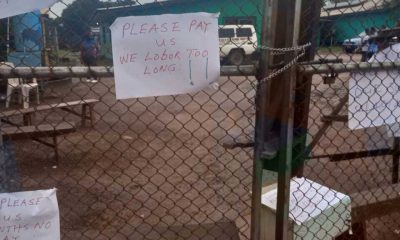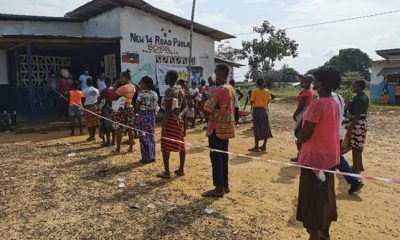
Margibi County – When cases of COVID-19 were confirmed in Margibi County, Goshen community – located upper Margibi County – set up two checkpoints at the two main roads leading to the community. At these checkpoints were hand washing buckets manned by community members, who would ask people entering or leaving the community to wash their hands.
This was the community’s approach to preventing the spread of Covid-19 in a county that has now recorded 42 confirmed cases and one death since the outbreak.
When the two “COVID-19 checkpoints” or hand washing stations were set up, the county had recorded less than 10 cases of the novel Coronavirus.
But these checkpoints equipped with hand washing buckets have been removed. Community members, who began the initiative, said it is because other community members and the government have failed to buttress their effort.
Mosses Fayiah led the team that manned and provided water and powder soap for the washing hand station for more than a month. He said that the stations were closed because they can no longer maintain them.
Fayiah, who is a local tailor, said that he cannot continuously leave his business that provides for his family and stay at the hand washing stations without support.
“No food is provided; nothing is given to us to keep running the stations and we cannot stay here because we have families and they need to survive,” he said.
He said at the start of the pandemic the district representative provided five bags of rice to be shared among his team members. And that was the beginning and end of the support, he added.

A partial view of a road leading to the community that had one of the two “COVID-19 check points” or hand washing stations. The hand washing station has been removed due to the lack of support | Photo By: Aria Deemie
Seven other men served as guards at the station but as they began to consistently complain about lack of support, Fayiah had to let them go.
“I had no choice but to allow them to go to do their normal businesses because they have families,” he said.
Romeo, a rock crusher, was one of those on Fayiah’s team. He opted to serve the community because it would have helped prevent the spread of infection into his community.
“I choose to serve as one of the guards because I saw the need and wanted to help my community,” Romeo said.
“After staying there awhile I realized that the community wasn’t supporting the initiative, so I decided to return to crushing rocks where I could get money from the sales than just staying whole day manning check point on empty stomach.”
According to him, residents refused to abide by the mandate from the Government because of their religious and personal beliefs. He recalled that on many occasions, residents refused to wash their hands at the station.
Meanwhile, madam Loli Flomo, a resident of Goshen community, is worried about the removal of the checkpoints or hand washing stations.
“When coronavirus started, these guards were to the rescue, they protected us,” she recalled.
“Now, there is a surge in the number of cases, they should still be at the stations and checkpoints to ensure that the residents and visitors abide by the preventive measure.”
But Kollie Karmoh, the community leader, said the community members should not be blamed for the dissolution of the hand washing stations.
“Community members contributed at the start but couldn’t Continue because the lock down had crippled many families [economically],” Karmoh said, adding, “Most of us are not working; it’s hard to get hold of money”.
Karmoh reckons that community members who were manning the stations had to abandoned them to cater to more pressing family issues.
“Some of the guards are family heads; we cannot deny them the finances they need to take care of their families during this tough time,” he said.
“Their presence at the stations without any payment or support had us receiving several complaints and so they had to leave.”
Aria Deemie is a practicing Liberian journalist, who is studying social work at the Mother Patern College of Health Sciences in Monrovia. She has acquired training from the SheWrites; SheLeads journalism mentorship program and LocalvoicesLiberia Media Network. Aria seeks to bring to light issues that have been withheld in the dark. She hopes to speak to the conscience of perpetrators of human rights abuses through her reports.


Methodology

True
The claim is rigorous and the content is demonstrably true.

Half True
The statement is correct, although it needs clarification additional information or context.

Unproven
Evidence publicly available neither proves nor disproves the claim. More research is needed.

Misleading
The statement contains correct data, but ignores very important elements or is mixed with incorrect data giving a different, inaccurate or false impression.

False
The claim is inaccurate according to the best evidence publicly available at this time.

Retraction
Upon further investigation of the claim, a different conclusion was determined leading to the removal of the initial determination.

Toxic
A rude, disrespectful, or unreasonable comment that is somewhat likely to make you leave a discussion or give up on sharing your perspective. Based on algorithmic detection of issues around toxicity, obscenity, threats, insults, and hate speech;
































































































































































































































































































































































































































































































































































































